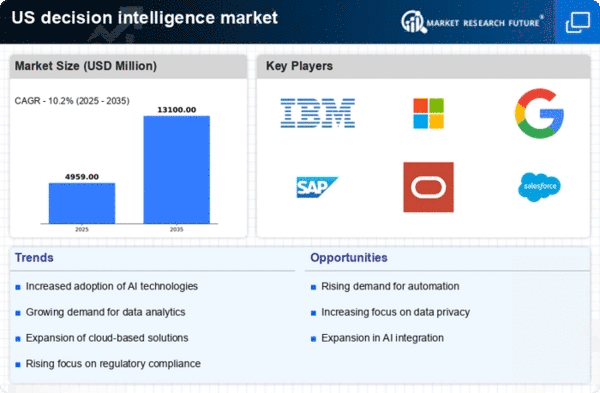Expansion of Cloud-Based Solutions
The expansion of cloud-based solutions is significantly impacting the decision intelligence market. As organizations increasingly migrate to cloud environments, the demand for scalable and flexible decision intelligence tools is on the rise. Cloud-based platforms offer enhanced accessibility, allowing teams to collaborate and analyze data in real-time, regardless of location. This shift is particularly relevant in the context of remote work and distributed teams. Market forecasts suggest that the cloud segment within the decision intelligence market could grow by over 40% in the coming years. This growth reflects a broader trend towards digital transformation, where organizations seek to leverage cloud technologies to enhance their decision-making capabilities. Consequently, the decision intelligence market is evolving to meet the needs of businesses seeking agile and efficient solutions.
Growing Demand for Predictive Analytics
The decision intelligence market is experiencing a notable surge in demand for predictive analytics solutions. Organizations across various sectors are increasingly recognizing the value of leveraging data to forecast future trends and behaviors. This shift is driven by the need for enhanced decision-making capabilities, as businesses seek to remain competitive in a rapidly evolving landscape. According to recent estimates, the predictive analytics segment is projected to grow at a CAGR of approximately 25% over the next five years. This growth reflects a broader trend within the decision intelligence market, where companies are investing in advanced analytics tools to gain insights that inform strategic initiatives. As a result, the integration of predictive analytics into decision-making processes is becoming a critical component for organizations aiming to optimize performance and drive innovation.
Increased Focus on Regulatory Compliance
An increased focus on regulatory compliance is emerging as a critical driver in the decision intelligence market. Organizations are facing heightened scrutiny regarding data privacy and security, necessitating robust compliance frameworks. This trend is particularly pronounced in industries such as finance and healthcare, where regulatory requirements are stringent. As a result, decision intelligence solutions that incorporate compliance features are gaining traction. Market analysis indicates that the demand for compliance-oriented decision intelligence tools is expected to rise by approximately 20% over the next few years. This shift underscores the importance of integrating compliance considerations into decision-making processes, ensuring that organizations not only make informed decisions but also adhere to legal and ethical standards. Thus, the decision intelligence market is adapting to address these evolving compliance challenges.
Integration of Machine Learning Algorithms
The integration of machine learning algorithms into the decision intelligence market is transforming how organizations analyze and interpret data. Machine learning enables systems to learn from data patterns, improving the accuracy of predictions and recommendations. This technological advancement is particularly relevant as businesses strive to automate decision-making processes and enhance operational efficiency. The market for machine learning in decision intelligence is expected to witness substantial growth, with estimates suggesting an increase of over 30% in adoption rates within the next few years. This trend indicates a shift towards more sophisticated analytical capabilities, allowing organizations to harness the full potential of their data. Consequently, the decision intelligence market is evolving, with machine learning becoming essential for organizations leveraging data-driven insights..
Rising Importance of Data-Driven Decision Making
The rising importance of data-driven decision making is a pivotal driver in the decision intelligence market. Organizations are increasingly prioritizing data as a strategic asset, recognizing its potential to inform critical business decisions. This trend is underscored by a growing emphasis on analytics and insights derived from vast datasets. In fact, studies indicate that companies utilizing data-driven strategies are 5 times more likely to make faster decisions than their competitors. As a result, the decision intelligence market is witnessing a shift towards solutions that facilitate data integration, analysis, and visualization. This evolution is not merely a trend but a fundamental change in how organizations operate, leading to more informed and effective decision-making processes.
















